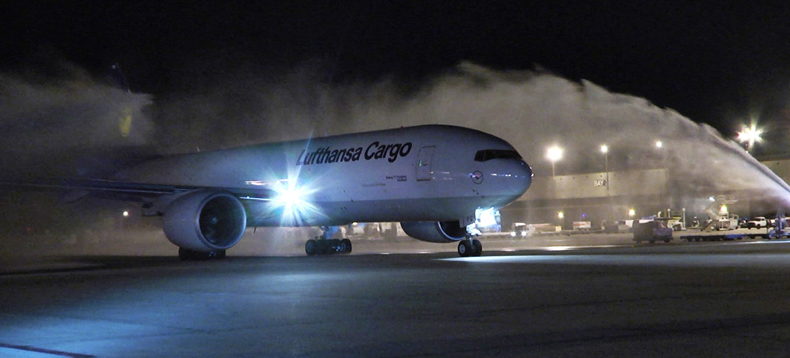No products in the cart.
Lufthansa Cargo reports operating loss, will park two freighters
 For the second-straight quarter, Lufthansa Cargo AG, the logistics and cargo arm of Germany’s Lufthansa Group, reported an operating loss. With no end to the current declining airfreight demand in sight, it is likely that the carrier’s cargo business will end up reporting its first full-year operating loss in six years.
For the second-straight quarter, Lufthansa Cargo AG, the logistics and cargo arm of Germany’s Lufthansa Group, reported an operating loss. With no end to the current declining airfreight demand in sight, it is likely that the carrier’s cargo business will end up reporting its first full-year operating loss in six years.
Lufthansa Cargo’s earnings before interest and taxes (EBIT) for the third quarter fell from a profit of €24 million in 2014 to a loss of €22 million this year. And for the first nine months of 2015, Lufthansa Cargo posted an operating loss of €38 million, compared to an operating profit of €69 million for the same period in 2014.
The fall in profitability is no surprise, given that cargo traffic and cargo yield are also falling. Lufthansa’s third-quarter cargo traffic was down 4.5 percent, year-over-year, to 2.08 billion revenue tonne kilometers (RTKs). This poor third-quarter performance brought the carrier’s traffic growth for the first nine months into negative territory, down 1.8 percent to 6.23 billion RTKs.
The declining cargo traffic comes against a background of increasing capacity and decreasing yield. Capacity was up 3 percent for the first nine months, driving cargo load factor for the period down 3.2 percentage points to 65.8 percent. The trend worsened in the third quarter, with load factor down 4.7 points to just 62.4 percent. Lufthansa’s cargo yield was still up slightly for the first nine months of 2014, but fell 3.9 percent in the third quarter, again indicating a worsening trend.
Given the current market conditions, and increased competition from “airlines from the Middle East and Turkey,” Lufthansa Cargo said it would park two of its fourteen MD-11 freighters. This will still leave it with a large freighter fleet, made up of five 777Fs and the twelve MD‑11Fs, but indicates the carrier is not expecting a return to growth in air freight demand any time soon.
On a positive note, Lufthansa Cargo said its partnership with Japan’s All Nippon Airways (ANA), has been operating successfully since its launch in December 2014. The Lufthansa/ANA partnership differs from the cargo deals undertaken by most airlines in that capacities on the partnership routes are marketed jointly by both partners – what Lufthansa and ANA call a “metal neutral” agreement.
Lufthansa Cargo also said it was making progress on the implementation of a new IT infrastructure for freight handling. The move, which it called “the biggest IT project in the company’s history,” is scheduled for completion by the end of this year.
















